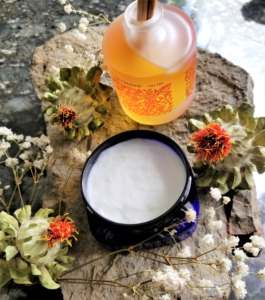
Scar cream
There are herbs, oils and butters that have properties to help diminish scars. This has to be used after the wound is healed and closed, diligently for 6 months as the skin starts to rejuvenate to get results.
In the comforts of your home, with very little cost.
Scar cream
Equipment
- Heat proof container
- Spatula
- Thermometer – candy or handheld
- Scale
- Clean jars
Ingredients
Phase A
- 190 gm Water/ Comfrey infused water/ Comfrey hydrosol
- 4 gm Glycerine, vegetable
Phase B
- 35 gm Emulsifying wax
- 9 gm Cetyl alcohol
- 31 gm Sweet almond oil, infused with dry comfrey leaves
- 15 gm Avocado oil
- 9 gm Shea butter
- 6 gm Macadamia nut oil
Phase C
- .90 gm Preservative : Liquid Germall Plus
- 1.0 gm Vitamin E
Phase D : Essential oils
- 2.0 gm Tangerine
- .60 gm Frankincense
- .30 gm Patchouli
Instructions
- 1. Measure ingredients by weight.2. Heat Phase A, not boil3. Melt Phase B4. When both are same temperature, around 120 F, add Phase A to Phase B, whisking well.Then, use a hand blender to whip until creamy.5. Add Phase C and D6. Place in clean jrs, label and date. Use within 6 months.
Do you have a scar that you wish will just fade away? These imperfections are quite embarras
sing as they appear in unwanted areas. Well, there are herbs, oils and butters in the plant kingdom that can help diminish them.
Comfrey to the rescue!
Most scar creams contain allantoin and you can buy them in a powdered form if you want them in your cream instead. But why buy them when you can have it naturally growing in your garden?
COMFREY
Comfrey (Symphytum officinale), often called knitbone, as it can “knit cells and tissues together”. The Cherokee tribe use this plant for a lot of ailments. I got my plant from my Amish friends and has become one of my favorite herb. It is an anti inflammatory, pain reliever and skin healer.
It is known for its high allantoin content which helps stimulate new cell growth and increase cell production. Its astringent tannins promotes healing by forming a protective layer over wounds. In other words, it causes cells to divide and grow for accelerated wound healing. It softens and soothes skin, speeds up tissue regeneration in insect bites, treats tags and warts, stops redness and irritation around wrinkles.
Due to its pyrrolizidine alkaloids, it is not recommended to be taken internally, thus we make a cream. Although a tea made from its leaves with calendula will help alleviate gastritis. Well,it is concentrated in the root (esp. Symphytum uplandicum) and in the fall season. The root should never be ingested in relation to liver cancer.
Why we choose these ingredients?
AVOCADO OIL – nourishing, protective
SHEA BUTTER – helps with dryness, damaged scarred skin
MACADAMIA NUT OIL – protective, healing, soothing esp. for damaged and scarred skin
FRANKINCENSE – promotes wound healing and rejuvenates the skin
PATCHOULI – cell regeneration